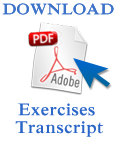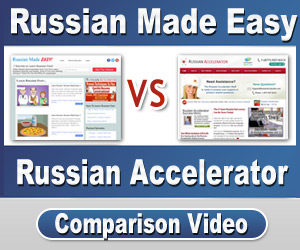How to Say My and Your in Russian
**New MEDIA CENTER – located here**
NOTE* – Episode downloads and extras are located at the bottom of this page.
Listen To Entire Episode
Exercises Only
If you can’t read Russian yet, lets get that out of the way. You can do it in just a few hours. Go here –> Learn to Read Russian Free Video Course
Welcome to this second podcast of Russian Made Easy. Let’s start by reviewing what we learned in the first podcast. Although we learned eleven new words — which is a lot — eight of them were cognates, so it was still a manageable amount of new words.
Anyway, imagine you’re in Moscow with some friends of yours who don’t know any Russian. After each Russian phrase you hear, please say the English translation out loud. Ready?
Мама – доктор.
Mom is a doctor.
[NOTE: As I mentioned in the transcript of Podcast 1, I’ve chosen to not sound out the Russian words in this transcript using English letters. So be sure to read along with the audio of the podcast. And if you’d like to be able to read Russian — and I promise you, it can be learned in just a few days — I’ll include a link at the bottom of this transcript to my course on reading Russian.]
Папа – бизнесмен.
Dad is a businessman.
Он – инженер.
He is an engineer.
Я – музыкант.
I’m a musician.
Наташа – студентка?
Is Natasha a student?
Николай – студент?
Is Nikolai a student?
So, how did you do? If you got all of those, you should feel really good about yourself. If you had trouble, then it’s probably a good idea to listen to the first podcast again, taking written notes as you go. Although, don’t worry too much. These podcasts are cumulative, so you’ll get more practice and exposure to all the words we learn.
Anyway, here’s our first new word for today. Please repeat after the native speaker:
Это
One more time:
это
Can you figure out the meaning? Imagine you’re in Moscow with your friends, John and Sandy. A Russian person has asked you who your friends are, so you point to John and say:
Это Джон.
Then you point to Sandy and say:
Это Сэнди.
Or imagine that a Russian acquaintance is looking at a photo of your parents. You point to your Dad and say:
Это папа.
Then you point to your mom and say…
…hmm, can you guess?
That’s right:
Это мама.
So, how would you translate ЭТО?
In this context, eto translates as “This is”
Pretend your Russian friend is looking at a baby photo of you. Of course, she can’t tell who it is, so you point to the photo and say:
Это я.
In English we’d say: This is me. But in Russian they phrase it literally:
This is…I.
Listen again:
Это я.
And that brings up an extremely important point:
V.O. And now, here’s your Tip of the Day from Russian Made Easy…
You need to know both the normal English version and the super-literal version for each phrase you learn. This is what I was referring to at the end of the first podcast: The biggest mistake that virtually all language students make is they don’t learn the super-literal translation of things…what we call the SLT. As you’ll see throughout these podcasts, I’ll always point out the SLT. This is a great shortcut to actually thinking in Russian.
OK, next…
Imagine you’re having dinner at your Russian friend’s house. Uncle Vadim plunks down a shotglass in front of you and fills it with a clear liquid, telling you:
Это водка.
What do you think he said? Listen again:
Это водка.
He said: This is vodka.
So the word vodka is a cognate. We say vodka, but in Russian it has a full “oh” sound:
водка
Listen again and repeat after our native speaker:
водка
You’re still at this Russian dinner, when grandma serves you a bowl of red soup, saying:
Это борщ.
Listen again:
Это борщ.
She said…This is borscht.
That last sound in that word is a sh-ch sound. Like, “fish chips”…shh-ch…
Repeat after the speaker:
борщ
If you’ve never had it, by the way, borscht is a delicious soup made with cabbage, beets, potatoes and a bit of pork.
Now let’s re-do this dinner scenario, except this time let’s ask about the food or drink. So, ask Uncle Vadim: This is vodka?
Это водка?
He nods his head,
Да, это водка.
Ask grandma: This is borscht?
Это борщ?
She smiles and nods:
Да, это борщ.
ДА as you probably guessed, is the Russian word for YES.
Of course, in normal English we’re more likely to phrase those questions by saying, “IS this” instead of the literal “This is”, right? We’d ask:
Is this vodka? That’s the normal English version. But they phrase it literally:
This is vodka?
ЭТО is such a useful word, we need to work with it some more. So pretend you’re showing your Russian friend some photos of your trip to Russia. She points to one photo and asks:
Это Сэнди?
Tell her:
Yes, this is Sandy.
Да, это Сэнди.
She points to another:
Это Джон?
Tell her: Yes, this is John.
Да, это Джон.
Imagine you’re showing her a family photo, now, and say the following phrases in Russian:
This is Dad. He is an engineer.
Это папа. Он – инженер.
This is mom. She is a doctor.
Это мама. Она – доктор.
This is Jeff. He is a musician.
Это Джэф. Он – музыкант.
This is Steve. He is a student.
Это Стив. Он – студент.
This is Tanya. She is a student.
Это Таня. Она – студентка.
Let’s add two new Russian words now. Repeat after the speaker:
мой….моя
One more time: мой….моя
As always, let’s try to figure out the meaning from context.
Imagine that the Russian dinner you’re attending has turned into a party. Lots of people are coming and going, putting their drinks down here, and their food down over there, and so on. You walk up to the table and pick up what you thought was your bowl of borscht, but some woman says…
Эй, это мой борщ!
Whoa! You put the woman’s soup down and back away apologetically. A bit later, you pick up the shotglass of vodka that you’re certain is yours. And yet, a guy turns and says:
Эй, это моя водка!
Again, you put his shotglass down and wander off in search of yours.
So, how would you translate these?
это мой борщ translates as, “This is my borscht.”
And это моя водка! translates as “This is my vodka.”
As we see, Russian has two different ways to say “my.” And actually, it has many, MANY more ways to say “my.” But first things first. Let’s see if we can figure out when to use мой and when to use моя.
In fact, I realize you have little or no experience with Russian grammar, and yet — just for fun — I wonder if you can guess which to use. In three words, how might you say:
He is my doctor.
Он мой доктор.
And how about: She is my student.
Она моя студентка.
Whether you got those right or wrong, we’ll come back and look at them in a minute. But I want to continue for just a moment by giving you two new, easy cognates. The Russian word for pizza is:
пицца
And the Russian word for soup is…
суп
Say them out loud:
пицца
суп
Now, just by guessing, how do you think you’d say:
This is my soup.
Это мой суп.
How about:
This is my pizza.
Это моя пицца.
I bet you’re catching on to a pattern here. Let’s try some more, to make sure you’re getting it. Say just…
My vodka.
Моя водка.
My pizza.
Моя пицца.
My borscht.
Мой борщ.
My soup.
Мой суп.
My male student.
Мой студент.
My female student.
Моя студентка.
In your own words, how would you describe the pattern here? Hit pause and think about it for a moment.
OK, so…If a word ends in an “ah” sound — like пиццА студентКА and водКА — it needs “моя.” Otherwise we use “мой”.
This is where so many Russian courses go wrong. They burden students right off the bat with the intimidating grammar terms for this. They make students memorize stuff like “nominative case” and “adjective noun agreement” and “declension paradigms” as if that’s how we actually learn grammar. Well it’s not.
The superior method for teaching grammar is to simply let the student discover the patterns. And in Russian, it’s particularly easy because — as you’ll see throughout these podcasts — Russian grammar is based on rhyming. Listen again…I’ll exaggerate the endings of the words:
моя пицца
моя водка
And how about…
она моя студентка
I’ll say it again, because this is a fundamental point: Russian grammar is based on rhyming. These words that end in an “ah” sound: пицца…водка…студентка and so on, are called feminine.
All the others are considered masculine. Now, admittedly, the masculine pairs weren’t really rhyming. I mean, суп doesn’t rhyme with мой. Neither does студент or доктор and so on. But masculine words WILL rhyme in many other situations. It depends on the phrase. Just know that there is a ton of rhyming in Russian, and I’ll be pointing it out as we go.
There is one exception to this pattern, though. Listen to our native speaker say: This is my Dad.
Это мой папа.
Это мой папа. Hmm….ПАПА ends in an “ah” sound, so why didn’t we say “моя”? Well, simply put, papa is masculine. Isn’t it? I mean, your Papa is a man. It doesn’t get more masculine than that. So, despite the “ah” sound at the end of papa, it’s still treated as a masculine word. That’s why it gets мой.
One last pair of new words, to wrap this all up today. Repeat after the speaker:
твой
твоя
One more time…
твой
твоя
Let’s try to get them from context. To do so, let’s go back one more time to that Russian dinner party we were at. You remember how you were picking up other people’s soup and vodka, thinking they were yours? Well, the host has noticed that and approaches with a bowl of borscht. She hands it to you, saying:
Это твой борщ.
She then hands you a shotglass…
Это твоя водка.
So, how would you translate these?
это твой борщ translates as, “This is your borscht.”
And это твоя водка! translates as “This is your vodka.”
So, твой and твоя are two forms of the word “your”. It’s an informal version that we use with friends and family members. We’ll learn the formal version in a future podcast.
Anyway, hand your friend a slice of pizza and tell him:
This is your pizza.
Это твоя пицца.
Hand someone their soup and say:
This is your soup.
Это твой суп.
Did you get those? We used твоя because it needs to rhyme with пицца
But we used the masculine form, твой with the word суп.
твоя пицца
твой суп
Imagine you’re at the party, talking with one of your friends who is a teacher. Pointing to a kid across the room, ask her:
Is he your student?
We’ll phrase it literally just: He your student?
Он твой студент?
Point to a girl and ask:
Is she your student?
Она твоя студентка?
Then you notice what seems to be a family photo on your friend’s desk. Point to the woman in the photo and ask:
Is this your mom?
Это твоя мама?
Now point to the man in the picture:
Ask: Is this your dad?
Это твой папа?
How will she answer:
Yes, this is my mom.
Да, это моя мама.
Yes, this is my dad.
Да, это мой папа.
Did you remember to use the masculine forms — твой and мой — for the word папа? Good!
Alright, here’s your final exam for this podcast. Try saying the following phrases in Russian. And please say them out loud…
Is this my soup?
Это мой суп?
Yes, this is your borscht.
Да, это твой борщ.
Is this my pizza?
Это моя пицца?
Yes, this is your pizza.
Да, это твоя пицца.
Is he your doctor?
Он твой доктор?
Yes, he is my doctor.
Да, он мой доктор.
Is she your mom?
Она твоя мама?
Yes, this is my mom.
Да, это моя мама.
This is my dad. He is an engineer.
Это мой папа. Он – инженер.
I bet you did great with those, so treat yourself to a slice of pizza today. And as you eat it, tell yourself, Это моя пицца.
In the next episode, along with teaching you some cool new phrases, I’m going to clear up a myth that people seem to believe in about Russian pronunciation. And in the meantime, as I mentioned at the end of the last episode, I’ve made a short, practice version of this podcast. It has just the exercises, without the explanations. So head over to RussianMadeEasy.com to grab a copy of those, and download the transcript to this podcast, and I’ll see you in the next episode.
CLICK HERE to learn to read Russian quickly and easily
DOWNLOADS – (right click with mouse and “save as”)


Please comment or share with one of the buttons below. Your support helps keep the ball rolling!





Leave a Reply to Mark Thomson Cancel reply